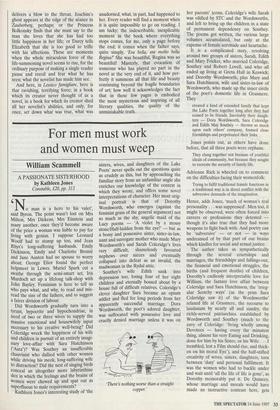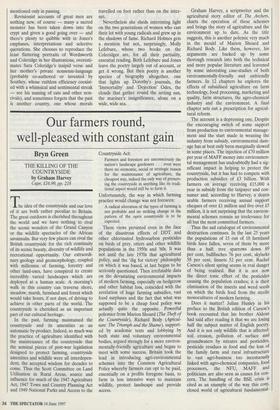For men must work and women must weep
William Scammell
A PASSIONATE SISTERHOOD by Kathleen Jones Constable, £20, pp. 313
No man is a hero to his valet', said Byron. The point wasn't lost on Mrs Milton, Mrs Dickens, Mrs Einstein and many another, once they'd become aware of the price a woman was liable to pay for living with genius. I suppose Leonard Woolf had to stump up too, and Jean Rhys's long-suffering husbands. Emily Dickinson, Emily and Charlotte Bronte and Jane Austen had no spouse to worry about. George Eliot found the perfect helpmeet in Lewes. Muriel Spark cut a swathe through the semi-smart set, Iris Murdoch set up a lifelong talk-shop with John Bayley. Feminism is here to tell us who pays what, and why, to read and mis- read the sins of the fathers, and to suggest a fairer division of labour.
Did Wordsworth gradually turn into a tyrant, hypocrite and hypochondriac, in need of two or three wives to supply the massive emotional and housewifely input necessary to his creative well-being? Did Coleridge wreck the happiness of his wife and children in pursuit of an entirely imagi- nary love-affair with Sara Hutchinson (`Asra')? Was Southey an insufferable chauvinist who dallied with other women while driving his meek, long-suffering wife to distraction? Did the nest of singing birds conceal an altogether more labyrinthine den in which the feelings and the brains of women were chewed up and spat out as superfluous to male requirements? Kathleen Jones's interesting study of 'the sisters, wives, and daughters of the Lake Poets' never spells out the questions quite as crudely as this, but by approaching the familiar story from an unfamiliar angle she enriches our knowledge of the context in which they wrote, and offers some novel interpretations of character. Her most orig- inal portrait is that of Dorothy Wordsworth, who emerges (against the feminist grain of the general argument) not so much as the shy, angelic maid of the Lucy poems — 'A violet by a mossy stone/Half-hidden from the eye!' — but as a bossy and possessive sister, sister-in-law, aunt and surrogate mother who made Mary Wordsworth's and Sarah Coleridge's lives very difficult, shamelessly favoured nephews over nieces and eventually collapsed into defeat as an invalid, the madwoman in the Rydal attic.
Southey's wife Edith sank into depression too, losing four of her eight children and eternally bossed about by a house full of difficult relatives. Coleridge's clever daughter Sara became an opium addict and fled for long periods from her apparently successful marriage. Dora Wordsworth, the poet's adored daughter, was suffocated with possessive love and cruelly denied marriage unless it was on `There's nothing worse than a straight copper.' her parents' terms. Coleridge's wife Sarah was vilified by STC and the Wordsworths, and left to bring up the children in a state of permanent dependency on Southey. The poems got written, the various large volumes accumulated, but only at the expense of female servitude and heartache.
It is a complicated story, revolving around two groups of sisters, Sarah, Edith and Mary Fricker, who married Coleridge, Southey and Robert Lovell, and who all ended up living at Greta Hall in Keswick; and Dorothy Wordsworth, plus Mary and Sara Hutchinson, wife and sister-in-law of Wordsworth, who made up the inner circle of the poet's domestic life in Grasmere. They
created a kind of extended family that kept the Lake Poets together long after they had ceased to be friends. Inevitably their daugh- ters — Dora Wordsworth, Sara Coleridge and Edith May Southey — thrown so much upon each others' company, formed close friendships and perpetuated their links.
Jones points out, as others have done before, that all three poets were orphans.
They clung together not because of youthful ideals of community, but because they sought to recreate the security of family life.
Adrienne Rich is wheeled on to comment on the difficulties facing their womenfolk:
Trying to fulfil traditional female functions in a traditional way is in direct conflict with the subversive demands of the imagination.
Hence, adds Jones, 'much of woman's real personality . . . was suppressed'. Men too, it might be observed, were often forced into careers or professions they detested though it's also true that they had more weapons to fight back with. And poetry can be 'subversive' — or not — in ways undreamed of by that part of our brains which kindles for social and sexual justice.
The author takes us sympathetically through the several courtships and marriages, the friendships and fallings-out, the financial and emotional struggles, the births (and frequent deaths) of children, Dorothy's endlessly interpretable love for William, the fantasy love affair between Coleridge and Sara Hutchinson, the 'irreg- ular Scotchy ways' (as the prim Sara Coleridge saw it) of the Wordsworths' relaxed life at Grasmere, the recourse to laudanum by nearly all and sundry, the richly-served patriarchies established by Wordsworth and Southey (much to the envy of Coleridge: 'living wholly among Devotees — having every the minutest thing, almost his very Eating and Drinking, done for him by his Sister, or his Wife . . . I trembled, lest a Film should rise, and thick- en on his moral Eye'), and the half-stifled creativity of wives, sisters, daughters, torn between 'duty' and personal fulfilment. It was the women who had to buckle under and wait until 'all the life of life is gone', as Dorothy memorably put it. De Quincey, whose marriage and morals would have made an instructive contrast here, gets mentioned only in passing.
Revisionist accounts of great men are nothing new, of course — many a sacred monster has been taken down into the crypt and given a good going over — and there's plenty to quibble with in Jones's emphases, interpretations and selective quotations. She chooses to reproduce the least flattering portraits of Wordsworth and Coleridge in her illustrations, overesti- mates Sara Coleridge's insipid verse and her mother's private nonsense-language (probably co-authored or invented by Southey, whose ruthless efficiency coexist- ed with a whimsical and sentimental streak — see his naming of cats and other non- rivals), and sometimes forgets that the past is another country, one whose morals travelled on foot rather than on the inter- net.
Nevertheless she sheds interesting light on the two generations of women who cast their lot with young radicals and grew up in the shadows of fame. Richard Holmes gets a mention but not, surprisingly, Molly Lefebure, whose two books on the Coleridges are, for all their partiality, essential reading. Both Lefebure and Jones leave the poetry largely out of account, or get it wrong. But then poetry is another species of biography altogether, one that lights up Dorothy's journals, the `Immortality' and 'Dejection' Odes, the clouds that gather round the setting sun, the mariner's insignificance, alone on a wide, wide sea.











































































 Previous page
Previous page